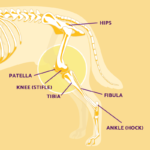Why Do Bernese Mountain Dogs Have A Short Lifespan
Introduction:
Bernese mountain dogs are a breed that is loved by many people. They are known for their gentle nature, loyalty, and intelligence. However, it is also true that they have a relatively short lifespan compared to other breeds of similar size. This raises the question – why do Bernese mountain dogs have a short lifespan? In this article, we will explore the reasons behind this phenomenon.
Subheading 1: Genetics play a role in their short lifespan
One of the main reasons why Bernese mountain dogs have a short lifespan is due to genetics. Studies have shown that this breed is predisposed to several genetic diseases that can significantly reduce their lifespan. For example, one common disease in Bernese mountain dogs is cancer, which accounts for nearly half of all deaths in the breed.
Another genetic condition that affects Bernese mountain dogs is hip dysplasia. This condition causes the hip joint to become unstable, leading to arthritis and mobility issues. Unfortunately, there is no cure for hip dysplasia, and affected dogs may require costly surgeries and ongoing treatment.
Subheading 2: Size matters
Size does matter when it comes to a dog’s lifespan. Larger breeds typically have shorter lifespans than smaller breeds due to the strain that their size puts on their bodies. Bernese mountain dogs are a large breed, with males weighing up to 120 pounds and females up to 110 pounds.
The sheer size of these dogs puts pressure on their joints and internal organs, making them more prone to health issues as they age. Additionally, larger breeds tend to age faster than smaller breeds, which means that they may experience age-related health problems at an earlier age.
Subheading 3: Lifestyle factors can impact lifespan
While genetics and size play a significant role in a Bernese mountain dog’s lifespan, lifestyle factors can also impact how long they live. One important factor is diet – feeding your dog a nutritious diet that is appropriate for their age and size can help keep them healthy and prevent chronic health conditions.
Exercise is another critical factor in a dog’s lifespan. Bernese mountain dogs are an active breed and require regular exercise to maintain their physical and mental health. Providing your dog with plenty of opportunities for exercise, such as daily walks or trips to the dog park, can help keep them healthy and happy.
Subheading 4: Emotional factors also come into play
Dogs are emotional creatures, and their emotional well-being can also impact their lifespan. Bernese mountain dogs are known for their loyalty and affectionate nature, which means they thrive on companionship and human interaction. Leaving your dog alone for extended periods or not providing them with enough socialization can lead to depression and anxiety, which can negatively impact their overall health.
Conclusion:
In conclusion, there are several reasons why Bernese mountain dogs have a shorter lifespan than other breeds. Genetic predisposition to cancer and hip dysplasia, their large size, lifestyle factors like diet and exercise, and emotional factors all play a role in how long these beloved dogs live. While we cannot change their genetics or size, we can take steps to provide our Bernese mountain dogs with the best possible care and love to ensure they live happy and healthy lives. After all, these gentle giants deserve nothing less!



